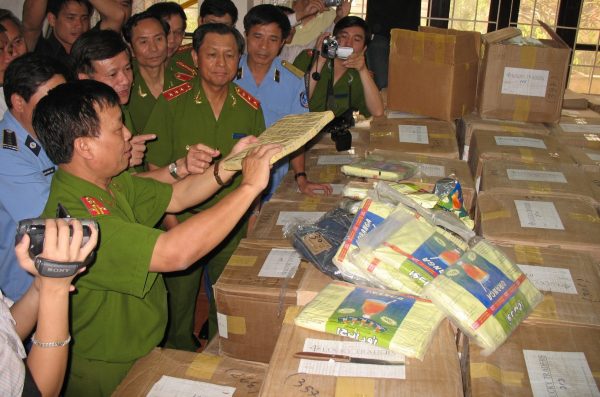In his official speech at the 7th session of the 14th National Assembly in May 2019, Minister of Public Security General To Lam highlighted the efforts of law enforcement agencies to combat drug-related crime in 2018. He focussed on drug cartel-related attacks in the northwestern provinces of Dien Bien, Hoa Binh and Son La. The Ministry itself has mobilised large police forces with modern weapons to conduct drug busts in the Long Luong district of Dien Bien.
Vietnam has in the past successfully controlled drug trafficking routes across the borders with China, Cambodia and Laos with the support of the UN Office of Drugs and Crime’s regional office. Control was achieved by enhancing bilateral and multilateral collaboration with neighbouring countries of the Mekong region.
But this causes a so-called ‘balloon effect’ — where traffickers change their modus operandi and move to other areas to avoid any strong concentrated anti-drug trafficking operations. Traffickers also move across borders to other locations in the region to avoid these enforcement campaigns.
After a shock to trafficking of this kind in Vietnam’s northwest, drug dealers began redirecting their activities into the central provinces, extending their operations to more southern routes to places like Ho Chi Minh City. In the first half of 2019, Vietnamese authorities investigated a number of drug trafficking syndicates in which foreigners and Vietnamese gangs colluded to transport drugs and illegal trade from the Golden Triangle via Vietnam to third countries in Southeast Asia and beyond.
The number of drug addicts in Vietnam has also grown despite the government’s efforts to curb and treat addicts after decriminalising drug use in 2009. When Vietnam became the first country in the region to decriminalise drug use, Vietnam’s drug control national action plan tried to address three pillars — supply, demand and harm reduction.
The strategy aimed to prevent drug trafficking and establish a rehabilitation program which uses methadone maintenance therapy (MMT) to reduce addiction. It also aimed to reduce the vulnerability of drug users with HIV/AIDS. But in the last decade, the effective outcomes of these programs have been limited. Drug trafficking is rising and the relapse rate of drug users undertaking community-based treatments is still high.
The number of drug users registered with the police is at least 220,000, with around 1600 people dying each year from drug overdoses. Actual numbers are likely much higher. Vietnam is facing obstacles in persuading addicts or their families to organise treatment. Administrative sanctions that place addicts in compulsory detention centres (CDC) still apply. But regular escapes of drug users from these rehabilitation centres brings into question the effectiveness of treating drug addicts via CDC. Vietnam’s authorities refuse to admit that these centres could be problematic.
MMT is cost-effective and has promising long-term outcomes. But since the introduction of both forms of treatment at the end of the 2000s, political concerns regarding compulsory drug treatment and MMT have delayed their use on prisoners with drug addictions. Officials acknowledge the benefits of MMT in eliminating withdrawal symptoms and drug cravings, decreasing the risk of HIV and the transmission of other blood-borne diseases, and reducing the likelihood of criminal behaviour. But the pilot program for prisoners was only implemented in 2015.
General To Lam argued at the National Assembly session that ‘if drug criminals want to increase drug sales, the number of addicts must increase … the police need to reduce the number of addicts and criminalise drug use’. But there is no evidence in Vietnam of the decriminalising of drug use resulting in an increase in drug trafficking. If the Minister’s proposals are approved, it is unclear what will happen to those drug users registered in compulsory drug treatment and how Vietnam’s authorities will deal with overpopulation in prisons.
A national study to examine and assess the impacts of the 2009 decriminalisation should be prioritised to help authorities design drug policies that decrease illicit substances abuse. Vietnam can learn from Portugal’s successful approach. Vietnam should rethink its strategies, programs and initiatives as they relate to all three pillars of the country’s national action plan, rather than just putting drug users in jail.
Hai Thanh Luong is Honorary Principal Research Fellow at the Royal Melbourne Institute of Technology (RMIT).

